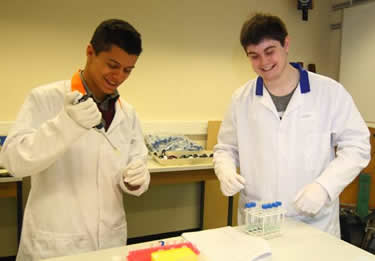Drug Testing Laboratory
NATIONAL SCIENCE WEEK
As part of University wide events for National Science Week Performance 2012 invited A level and GCSE pupils from local schools and collages to come and learn more about drugs in sport. Students were given the chance to carry out a mock drugs test and this was followed by a debate on the ethics of the use of drugs and gene doping in sport. This session could be reapeated in a school or a similar environment.
DRUGS TESTING LABORATORY SESSION
The aims of these workshops are to
- To raise students awareness of the performance enhancing drug erythropoietin (EPO) and its effects in sport.
- To allow students to gain knowledge and experience of the testing procedure used on real athletes samples in competitive sport.
- To provide knowledge and understanding of the ethical arguments for and against the use of gene doping in sport.
Resources are available to run your own drug tesing laboratory.
- Background- What is EPO?
- Introductory PowerPoint presentation
- Equipment list
- Olympic drug testing protocol
- Gene doping debate powerpoint presentation
- Gene doping information resource
The students deduced from their experimental findings that out of the 4 athlete's samples tested, one was well within the normal range (1-24 mU/ml), one sample was on the borderline of normal range, one sample was above the threshold but not by much and the last athletes EPO levels were a long way above the threshold.

ETHICAL DEBATE
Following the time in the laboratory, pupils should be encouraged to debate which of the mock athletes they believed to be cheating and the implications and issues associated with this.
The outcome of the drug testing lab session may not be as clear as the test suggests. Areas to highlight and discuss include-
- The sample which was within the normal threshold could still come from an athlete who had used EPO but had also used a masking agent or given a false sample.
- The 'borderline' samples could have occurred from either the use of EPO or simply a result of altitude training.
- The sample which was well above the normal level does not necessarily mean the athlete was guilty. There have been athletes, such as skier Eero Mäntyranta and triathlete Rutger Beke, who returned unusually high values and were thought to be guilty only to be proved innocent.In Mäntyranta’s case physiological testing showed that he actually had a genetic mutation of his EPO receptor gene which caused EPO to be more effective. Beke proved that his sample had been contaminated by bacteria which caused it to appear that he had excessive levels of EPO.
Pupils could then be introduced to a new threat to the integrity of sporting events, the use of gene doping by athletes to enhance their performance. Gene doping is defined by the World Anti-Doping Agency (WADA) as "the non-therapeutic use of cells, genes, genetic elements, or of the modulation of gene expression, having the capacity to improve athletic performance". There are at least 187 genes linked to athleticism, all of which could potentially be altered to enhance sporting performance.
Laboratory examples of gene doping-
- Gene doping has been used to enhance the performance of animals for example, the "Schwartzeneger Mouse"“Schwartzeneger Mouse” which, by inserting the gene for Insulin-like Growth Factor-1 (IGF-1), created mice which had much larger muscles and were stronger than normal mice. These mice showed none of the loss of muscle or muscle function that normally occurs with age. At the age of 20 months (an old-age pensioner for mice) they were still stronger than young adult mice.
- Changes to the PEPCK-C gene created "Mighty Mice"which can run, without stopping, for over twenty-five times the distance a normal mouse can run. Mighty Mouse v Wild Mouse
Whilst there is no evidence of gene doping currently being used in sport, WADA was sufficiently concerned that, in 2004, it added it to its list of banned technologies.
Using mind-maps, students discussed the ethical arguments for and against the use of gene doping in sport, thinking about these issues as-
- The athlete
- Fellow competitor
- Coach
- Fan
- The sports governing body
- A scientist or doctor
If you would like some more ideas for debating the use of drugs in sport have a look at this Debate-Kit-for-Drugs-in-Sport from The Physiological Society.
Listen to the edited podcast of this session.